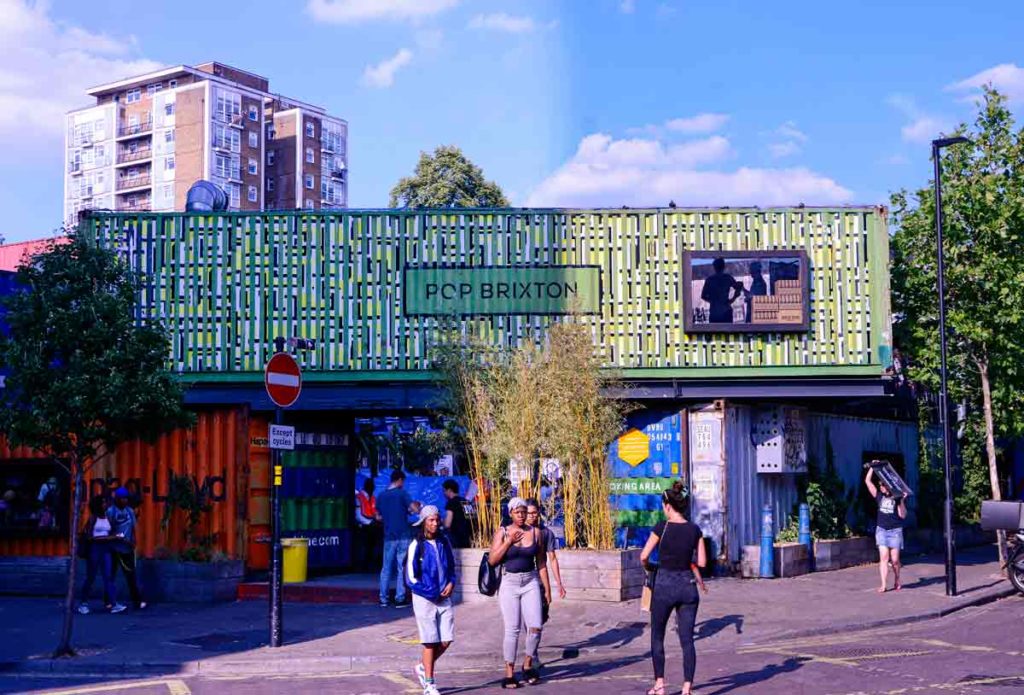
The transformation of central Brixton will enter a new stage next week when Lambeth council’s cabinet decides on its approach to redevelopment of the sites of International House and the Pop Brixton.
The council owns both sites, which are currently occupied on a short-term basis. It hopes to lease them to a development partner for at least 250 years.
Joint development of the two sites, which are only a few metres apart on Pope’s Road, would combine more office space and affordable housing, some of it at council rents, the council said.
Community and local stakeholder engagement “from the outset” is promised in a report to be considered by the cabinet next Monday (8 February).
The report says the development would include 120 affordable homes, of which about 80 would be at council rent and prioritised for local people.
It is also expected to provide a minimum of 1,300 square metres of affordable workspace.
While the report does not mention the controversial plans for a large development including a 20-storey tower a few metres from the two sites, it does refer to the large amount of office space it will have.
“Together with other schemes coming forward in the wider town centre there is potentially about 43,500 square metres of new commercial and affordable floorspace being brought forward over the coming years by a range of different landowners,” the report says.
The Pop Brixton and International House sites are expected to offer a minimum of 1,300 square metres of affordable workspace, contributing to an “expected pipeline” of about 5,000 square metres of new affordable workspace.
Cllr Matthew Bennett, cabinet member for planning, investment and new homes, said the development would represent “an exciting opportunity for Lambeth council to respond to what Brixton needs: more homes, more jobs, more opportunities for local people”.
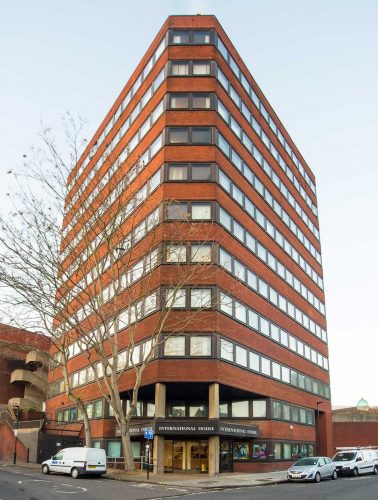
He went on: “Instead of seeing development being something that feels like it’s just built in Brixton, we have a chance to respond to what the community in Brixton needs and build for Brixton.”
He said that, crucially, the council wanted to find a developer that would operate “in partnership with the community, working with them on what Brixton needs”.
The council was “starting this process, not with fancy images and architecture, but with a recognition of what local families, local people and local businesses need to thrive as we emerge from Covid-19,” Bennett said.
As of the 1 December, there were more than 3,000 people in the wards of Ferndale, Coldharbour, Herne Hill, Tulse Hill, and Brixton Hill on the council’s housing register and actively seeking homes.
Behind that number, Bennett said, were families living in cramped, overcrowded homes, trapped in insecure and overpriced private rented homes, and having to leave Brixton because there are not enough council, social and affordable homes.
“The only way we can start to put this right is to build many more homes, especially council homes,” he said.
The report says Covid-19 has seen an increase of 3,415 Brixton residents who are now job-seeking claimants.
“If we want local Brixton successes to stay in Brixton, creating more jobs, more apprenticeships, more training opportunities and the chance of a better life – then we need to make space here in Brixton for that to happen,” Bennett said.
This was what the council had done with the “Your New Town Hall” project and would do in the redevelopment of Somerleyton Road, he said – “using land that the council owns to build more council homes for local families, create more opportunity for local people, more jobs, and more space for local businesses to grow and succeed here in Brixton.”
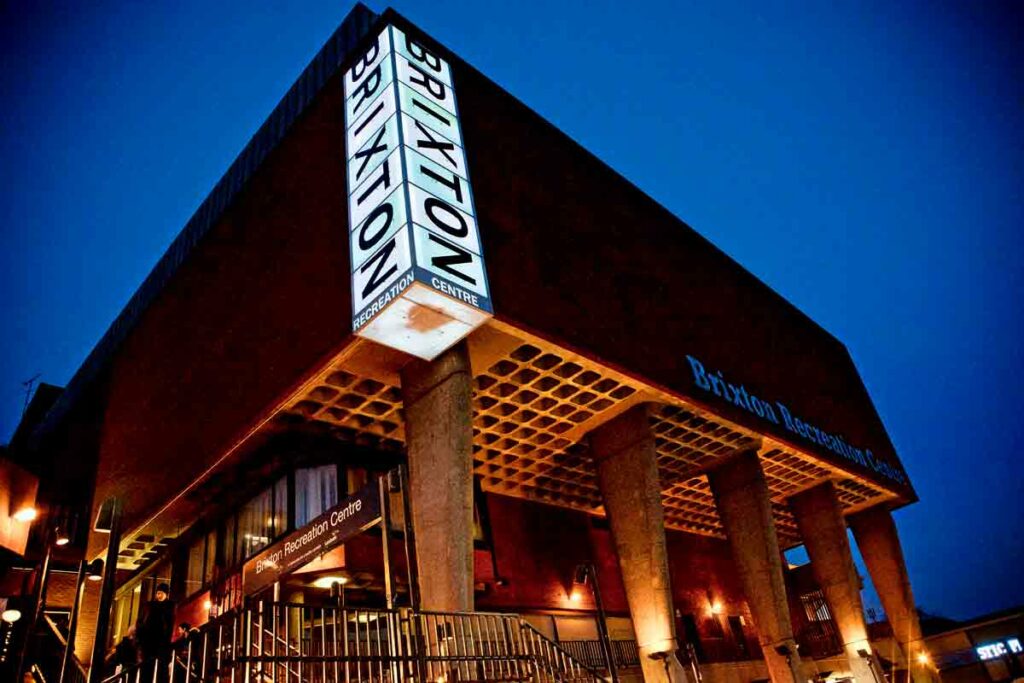
More affordable work space is also planned in a reformatting of an unused former storage space off Beehive Place in Brixton Rec, which stands between Pop Brixton and International House.
Pop was once the site of a 1970s multi-storey car park. Its demolition in 2010 was blamed by many for the decline of Brixton markets. International House was for many years used as council offices.
While it is pledged to involve the local community in the new development, the council provoked fury when it decided not to allowing a community-based organisation, Brixton Green, to develop Somerleyton Road. The council had previously worked with Brixton Green on the project for many years and th community organisation had received substantial grant funding.
In an open letter to the council cabinet, Brixton Green said the decision was a massive missed opportunity and demonstrated that the council was “not serious about enabling the community to lead”.
The Somerleyton Road decision came as the council launched its own commercial “vehicle” to build housing – Homes for Lambeth.
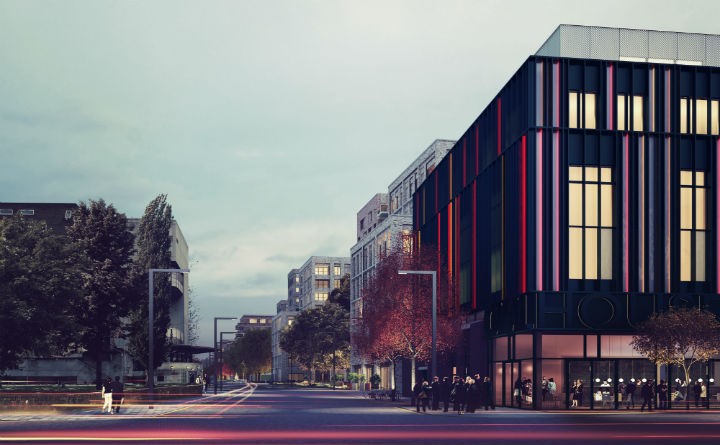
Bennett said Pop Brixton and 3Space at International House have been great successes on a “meanwhile” basis, but that “now we’ll build a permanent home for Brixton’s businesses, with more than double the amount of affordable workspace required by Lambeth’s ambitious planning policy”.
He promised the council would “work with the community, from day oneto help shape these plans in a genuinely inclusive way”.
The report for the cabinet says that bidders will be expected to “set out clear commitments and a convincing strategy for ensuring successful and inclusive consultation, engagement and co-design in both the development of the scheme and in its later operation.”
They will need to set out specific proposals “in respect of setting up engagement structures that will allow the community to meaningfully feed into the proposals on an ongoing basis as they develop.”
The council will oversee delivery of these commitments as well as the overall project through a proposed joint delivery board.
It has been attacked in recent years for inadequate consultations on projects including demolition of the Cressingham Gardens estate, or ignoring local opinion, as in the case of the 20-storey tower on Pope’s Road.
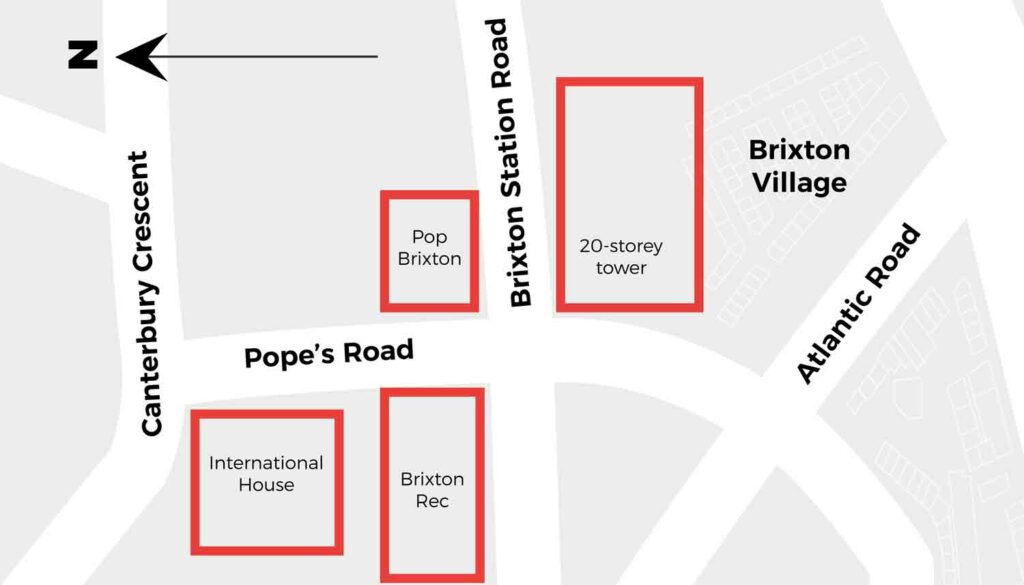
“Meet the bidder” community events as part of the consultations on the project are scheduled for September this year, with the contract due to be awarded in March 2022.
The cost of the external legal and commercial support for the procurement process is estimated at £238,714 in the cabinet report.
It rules out the idea of the council developing the sites itself, because its resources “are already committed to an ambitious housing delivery programme via Homes for Lambeth”.
In this instance, the report says, “all of the council’s objectives can be secured through leveraging the procurement process to secure an appropriately experienced delivery partner.”






